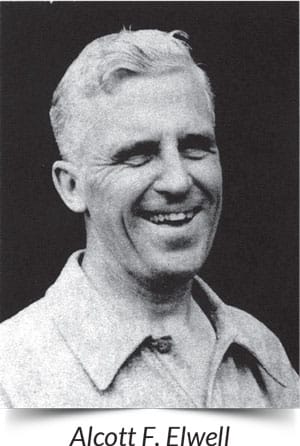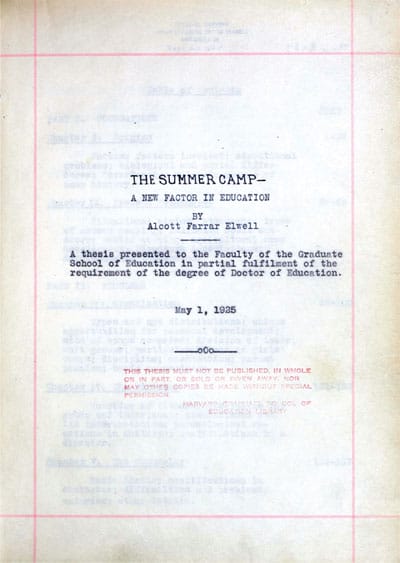By Tomo Nishino (‘84)
 On May 1, 1925, the 39-year-old Alcott F. Elwell submitted to the Harvard Graduate School of Education a doctoral thesis titled “The Summer Camp—A New Factor in Education.” He had served as a Counselor at Mowglis on and off since 1905, a year prior to enrolling at Harvard as a part of the undergraduate class of 1910. Owing to financial reversals, it took him 11 years to complete his undergraduate degree. In the interim, he served as the Assistant Director of Mowglis, starting in 1914, and was commissioned an officer in the U.S. Army in 1917. After the Great War, he returned to Harvard to pursue a graduate degree in education, completing his doctorate in 1925, the same year that he assumed ownership and directorship of Mowglis.
On May 1, 1925, the 39-year-old Alcott F. Elwell submitted to the Harvard Graduate School of Education a doctoral thesis titled “The Summer Camp—A New Factor in Education.” He had served as a Counselor at Mowglis on and off since 1905, a year prior to enrolling at Harvard as a part of the undergraduate class of 1910. Owing to financial reversals, it took him 11 years to complete his undergraduate degree. In the interim, he served as the Assistant Director of Mowglis, starting in 1914, and was commissioned an officer in the U.S. Army in 1917. After the Great War, he returned to Harvard to pursue a graduate degree in education, completing his doctorate in 1925, the same year that he assumed ownership and directorship of Mowglis.
Elwell’s doctoral thesis—part an impassioned ode to the American camp movement, part a historical survey of summer camps in the U.S., part an attempt to “scientifically” articulate the benefits of the summer camp, and part a meticulous “how-to” manual—laid out his vision for what he called the “School of the Open,” a summer camp devoted not to entertainment, but to education. Look past the brittle yellowed pages and the old-fashioned type and language, and one is astonished at just how prescient his observations and insights were.
Elwell was writing at a time of profound change. The largely agrarian society that characterized much of the U.S. at the time of his birth was rapidly disappearing. People were steadily abandoning their farms for the city—two-thirds of the American population lived on farms around the time of Elwell’s birth, but by 1925 that number was less than half—and his native New England had led the way. The Great War was safely behind us, the Roaring Twenties were well under way; city life enticed ever more people into crowded tenements and apartments, cutting them off from their connections to the land; mass industry demanded a new kind of education, and newfangled entertainments like jazz and the cinema proved irresistible.
Elwell fretted about how these profound societal changes would affect the young. He noted that the biological capacity of humans had hardly changed in millennia, even as the realities and pressures of modern life demanded ever more from each individual. He noted that a Captain in the Great War was expected to know more than a Colonel in the Civil War, or that a “modern” farmer, operating a tractor, electrical lights, and a radio, needed to know more than a “wise scientist” from generations past. He worried that these new pressures were affecting children most of all, ever hemming in their lives with more and more demands—a concern any modern parent with over-scheduled children would understand. He worried that children who knew only the artificial, man-made and hemmed-in life of the city were losing touch with the physical “laws” of the natural world. Replace the word “city” with “virtual,” and his concerns are those of a parent today. Elwell even complained of too much “screen time”— though he was referring to the then new technology, the motion picture.
Elwell’s solution was the “School of the Open.” He noted that the normal school system—beset by the demands of education in the new “Industrial Age” (which echoes our own anxieties today about the demands placed on education in the age of the “gig-economy”)—was simply incapable of responding to the distortions and pressures of the modern era. He envisioned that the “School of the Open,” which would simplify life to its core essential values and bring children back into contact with the real, physical, and natural world, would complement the schools by providing children with essential education that would (re-)humanize them amidst the demands of the urban-industrial world.
 Elwell sought to create an environment where children could acquire those elements he deemed necessary in order to deal with the “speed and complexity of modern life.” His program was that of radical simplification that emphasized authentic values, while at the same time inculcating in children “the outlook of success” through positive encouragement. He sought to pull children away from the atomizing and competitive individualism of the modern education system by emphasizing “fair-play,” cooperation, and group success, while at the same time stressing the will to succeed. He notes that the School of the Open should bring to children “1. Expectations of success; 2. a fearless outlook; 3. undiminished hope; 4. the “see-it-through” attitude.”
Elwell sought to create an environment where children could acquire those elements he deemed necessary in order to deal with the “speed and complexity of modern life.” His program was that of radical simplification that emphasized authentic values, while at the same time inculcating in children “the outlook of success” through positive encouragement. He sought to pull children away from the atomizing and competitive individualism of the modern education system by emphasizing “fair-play,” cooperation, and group success, while at the same time stressing the will to succeed. He notes that the School of the Open should bring to children “1. Expectations of success; 2. a fearless outlook; 3. undiminished hope; 4. the “see-it-through” attitude.”
To achieve these ends, in his thesis, Elwell lays out in meticulous detail what he thought were the key elements of the School of the Open—the Director (“must be an organizer able to radiate ideals with background and balance”), the Council Staff (“as living examples counselors can do more than in any other way”), duties (“each camper should experience the breadth and necessities of communal life”), spirit (“the final expression of success is the ‘spirit’ of the camp”), rules (“must be few and inflexible”), the camp uniform (“the uniform becomes not only a visible bond of unity, but an expression of singleness of purpose”), camping (“an opportunity for the modern child to see behind the curtain of civilized life and realize that there are physical conditions which man does not control”), play (“an educative process quite apart from relaxation”), industries (“work which is not academic but at the same time requires instruction and study”), and many other practical considerations besides, ranging from the optimal size of the camp to the physical plant and the health and welfare of the campers and staff.
He lays out the rationale for specific industries as both opportunities for education and for children to try new things. “On the Trail,” he writes, “there are lessons to learn. Wind, rain, and sun to face. These things do not man’s bidding.” He notes that among industries Nature Study—to inculcate a love of nature—should be prominent. “The man or boy who pulls the toad from the cart track and puts him safe in the ditch can say with Mowgli of the Seonee Wolf Pack: ‘We be of one blood, little brother!’ He has begun to love things and the beauties of nature he cannot help but see wherever he goes.” He goes on to elaborate on the educational value of swimming, crafts, canoeing, riflery, “trail craft,” and much else. And he lays out a daily schedule—consisting of duties, industries, relax, swimming and campfire—that would be familiar to any Mowglis camper today.
What becomes apparent upon reading Elwell’s thesis is just how carefully the Mowglis program was crafted to achieve the educational goals that he sought. And nearly a century later, that the program endures remarkably unchanged (as evidenced by reflections from the 1940’s elsewhere in this issue), is a testament to his thoughtfully constructed vision.
Elwell envisioned far greater things for the camp movement. In the penultimate paragraph of his thesis, he opined, “The organized camp may, before long, fill a gap between the conservative past and the too radical future.” He thought that the camp would become an integral part of the American educational landscape that would help children cope with the demands of modern life. This grander vision was, we now know, not to be. What is striking in reading his thesis, though, is despite the old-fashioned language, just how contemporary he sounds. His anxieties about a rapidly transforming world in which the old verities no longer seem to apply are our anxieties. And if it is true that the only constant in history is that there will be change, then one suspects that these anxieties will be there for the next generation as well. We do have one advantage on the Colonel, though. Thanks to him, in Mowglis we have a trail map out of the woods.
As Elwell wrote in the final paragraph of his thesis: “The School of the Open is a school for simplicity and primitive reality, in which growth is in social ideals and cooperation coupled to better understanding of one’s self. The child who can see simply and look into the heart of nature will have a key to the Book of Life—this is Education.”

